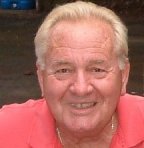 Walt Barrett |
Fuel cells are no longer a pipedream. They are in use in forklifts and are poised to take more marketshare.
Christine Cranney investigates some of the issues.
Walt Barrett, CEO of Rhode Island, USA-based A to Z Global Marketing Inc, is the inventor of Battery Chem, a 25-year-old product that rejuvenates lead-acid batteries and extends the life of electric forklifts and other vehicles. He is also a business consultant with a keen interest in energy.
Besides a stake in battery forklifts, his company is developing low-voltage fuel cells to power items ranging from cell phone chargers and LED lights to computers. Fuel cells for forklifts and other transport vehicles are in the pipeline.
Barrett's firm has been funding its own fuel cell technology research.
While the 78-year-old visionary believes that we will see a day when "anything electrical including forklifts" will be powered by fuel cells, there are materials handling industry members who are sceptical about the future of fuel cell technology.
Some say an expensive optionTim Jamal from Canadian used forklift wholesaler Jamco thinks fuel cell forklift technology is a "frenzy [that] will just fizzle away".
"If you look at a fuel cell forklift, the customers that are buying or testing them are the Fortune 500 types. I think they are motivated by the government incentives and rebates. You pull out the incentives and a typical fuel cell forklift is an expensive option," Jamal says.
Jim Lane, VP of sales for Texas-based battery change equipment maker Materials Transportation Company (MTC), agrees that without government grants and subsidies, no US firm would be using the technology.
"I can't see fuel cell or hybrid forklifts becoming mainstream until the cost per kilowatt reaches the same (as) or is better than lead acid batteries and chargers," Lane says.
He thinks that before the technology becomes popular with fleet managers, there must be "a cost-effective method to produce hydrogen on-site, less expensive vessels to hold compressed gases at 10,000 psi and lower-costing energy to reform gas to hydrogen".
Barrett, whose firm receives no government grants, says incentives or not, any manufacturer that wants to survive has no choice but to keep up with or surpass the competition when it comes to R&D. "I always say that the first one into a new market gets half the market if they have a decent product."
Forkliftaction.com News contacted James Warner, policy director for Fuel Cell and Hydrogen Energy Association in Washington DC, and Gus Block, marketing director from Nuvera Fuel Cells in Massachusetts, to respond to some of the cost issues.
 James Warner |
Warner says there are a number of companies in the US including Google, Wal-Mart, Whole Foods, Sysco, Central Grocers and Wegmans that are buying fuel cell systems without government subsidies. "They are not spending money on a science project. Fuel cells provide competitive advantages that batteries or propane and engine forklifts cannot compete on.
"A huge number of Fortune 500 companies are adopting [fuel cells] for commercial reasons ... In plants with split fleets, operators line up at the start of a shift to get a fuel cell forklift versus one powered by propane or gas or diesel. These operators can do their job better."
The Argonne National Laboratory, one of the US Department of Energy's oldest laboratories, says fuel cell forklifts using hydrogen provided on-site from natural gas are as efficient as battery-powered forklifts but produce 33% less greenhouse gases.
As green as they may be, fuel cell forklifts are still costly.
Nuvera's Block believes fuel cell forklifts will become "mainstream" in different materials handling applications at different rates. The first market for fuel cell forklifts will be grocery distribution and other intensive applications where the productivity boost offers a significant cost-of-ownership advantage over batteries.
"There are other, less heavy-duty applications where the savings will not be as dramatic, but still very attractive, since the operating costs over the product's lifecycle will still justify the higher capital investment," Block explains. "And there is a certain portion of the market in which fuel cells will not compete economically in the foreseeable future since the duty-cycle doesn't justify it."
Warner explains that there are several ways to fuel forklifts. "Hydrogenics Corp of Ontario, Canada and Proton Onsite of Connecticut, US are looking into distributed solar or wind power. If methane or natural gas is available on-site, a user can run it through a reformer to make hydrogen. If a refinery is nearby or the plant is near a facility of Linde, Airgas, Air Products, Praxair or Air Liquide, they can use a reformer.
"BMW Manufacturing in South Carolina has a landfill nearby and can tap methane from landfill for hydrogen. Because hydrogen is a fuel with versatile sources, its cost effectiveness will depend on where the plant is located."
On the matter of costly vessels to hold compressed gases at 10,000 psi, Block explains that that pressure target is associated with automobiles, not forklifts. Higher pressure enables a longer driving range, which is critical for automobiles because there are fewer hydrogen refueling stations. At a warehouse or distribution centre, the forklift's range is less of an issue because refueling can be done at dispensing points in the facility.
"While very high pressure hydrogen tanks are more expensive, the real cost of 10,000 psi hydrogen is associated with the energy required to compress the hydrogen to that pressure using mechanical devices," Block adds.
Summing up the cost issue, Block says on a "capital cost basis", fuel cells are competitive with batteries today for the right applications.
"Because fuel cells are new to the market, they are produced at a small fraction of the volume of batteries. There are very significant cost-reduction opportunities with fuel cells associated with manufacturing refinements and bulk purchasing of raw materials.
"A single fuel cell power pack will replace two to three batteries and chargers in a two to three shift operation, and their product life is two to three times longer ... This doesn't even take into account the savings associated with higher productivity, which is the main driver for their use."
Leasing IssuesJamco's Jamal wonders about a used or rental market for fuel cell forklifts. "One of Jamco's divisions is a wholesaler of used forklifts. We would not want to invest a lot into a fuel cell vehicle as who would you re-market it to?
"A current traditional purchaser of a used forklift will not have the infrastructure in place to re-fill the fuel cell unit and I'm pretty sure the original selling OEM dealer would not want a fleet of them on their floor either.
"What type of residual value do you place on leasing a fleet of fuel cell forklifts? One dollar in my opinion ... once the 36- or 48-month term expires, what happens to the asset?" he asks.
 Gus Block |
Nuvera's Block says that as with any leased forklift fleet, the residual value will depend on the hours of operation, type of application the fleet operates in and the lease structure. "Fundamentally, the residual value should be equal to a battery-powered forklift fleet, but as the fuel cell market matures there will be a secondary market available for fuel cells particularly due to the longer lifecycle versus batteries."
The Developing WorldGreen forklifts like electric and hybrid forklifts will still have a market even when fuel cell forklifts are commercialised.
Barrett says it is a matter of economics, especially in the third world, where forklift regulators and users are gradually acknowledging the damage pollutants do to their warehouse employees' health.
Block explains that battery-powered and fuel cell-powered forklifts are both electric, so adoption of one technology over another will be a matter of economics, government regulation and policy, and resource availability. "Hydrogen and electricity are both energy carriers, not primary energy sources; both can be made from renewable feedstocks in addition to conventional fuels.
"Hybrid trucks may predominate longer in developing countries where carbon-based fuels are cheap compared to hydrogen or electricity produced renewably, or from clean feedstocks and where few incentives exist to adopt green technologies."
Hybrid developmentsIndustry members
Forkliftaction.com News interviewed rate Toyota as a major forklift player in the fuel cell and hybrid forklift market.
Toyota Industries Corporation (TICO) showcased the Toyota FCHV-F, a prototype forklift powered by a fuel cell hybrid system at CeMAT 2005 in Hannover, Germany. TICO developed the fuel cell hybrid system with Toyota Motor Corporation (TMC), which developed the first fuel cell car prototype in 1996. Equipped with a Toyota FC stack fuel cell, the forklift could carry a maximum 2. 5 T load.
In 2006, Still GmbH introduced the RX70, available in 2.2, 2.5, 3.0 and 3.5 T load capacities. The German manufacturer claimed the RX70 was the world's only forklift with hybrid technology. The forklift, which was two years in development, consumes 2.5 L of fuel an hour, making it the most economical forklift in its class at that time. It is based on the RX70 diesel truck.
The next year, Proton Motor Fuel Cell GmbH claimed to be a pioneer in combining a fuel cell, a battery and supercapacitors to produce the world's first triple-hybrid forklift system. Proton CEO Felix Heidelberg said users could enjoy over 50% energy and cost savings over diesel forklifts using the hybrid power system.
In May 2008 Linde introduced a hybrid truck at CeMAT 2008 in Hannover, Germany. Linde's hybrid truck was based on a 39X series diesel forklift and can lift up to 3.5 T. Besides an internal combustion engine, the forklift has an electric motor that can operate a starter and generator. Linde said the forklift reduces fuel consumption by up to 25%.
TICO launched what it claimed was the world's first internal combustion hybrid forklift in the Japanese market in December 2009. The "Geneo Hybrid" was targeted at the over 3 T load capacity electric forklift market in Japan.
Using Toyota Motor Corporation's hybrid technology, TICO developed a hybrid system that combined a diesel engine, electric motor and battery power. According to values measured by TICO based on Japanese industrial standards, the Geneo Hybrid reduces carbon dioxide emissions and fuel consumption by 50% and performs like a 3.5 T diesel forklift.
In 2009, Komatsu Forklift demonstrated a battery electric hybrid forklift in Australia. The 1.5-2.5 T hybrid counterbalance forklift uses a motive power battery and a supercapacitor. The hybrid controller captures regenerative energy from kinetic energy normally lost when braking and changing direction and then stores this power in the capacitor. Power is released as needed to achieve peak performance levels.
Last year, Mitsubishi's exclusive dealer in Bahrain, Zayani Motors, introduced a range of hybrid forklifts in Bahrain. The Mitsubishi hybrid forklifts, which are manufactured in Japan, were launched as the world's first 4-5 T hybrid forklifts at the Bauma exhibition in Munich, Germany.
Developments in Europe Steffen Møller-Holst, research manager of SINTEF (Scandinavia's largest independent research organisation), told
Forkliftaction.com News this year that the HyLIFT-DEMO involving 30 DanTruck forklifts is a large-scale project aiming for the market introduction of fuel cell forklifts by 2013.
"The specific outcome of the project will be the successful demonstration that fuel cell technology complies with the requirements for market introduction, [in terms of] cost, durability, reliability, safety, etc," he explains.
The project, which uses 2.5T forklifts that were recently showcased at CeMAT in Hannover, Germany, is co-funded by the European Joint Undertaking for Fuel Cells and Hydrogen FCH JU.
Fuel cell hybrid power systems developer H2 Logic and forklift manufacturer DanTruck A/S have collaborated since 2006 to develop a new hydrogen-powered forklift with a fully integrated H2Drive TM fuel cell system from H2 Logic. The result is a new 2.5T forklift for heavy-duty applications. H2 Logic is establishing the hydrogen refuelling infrastructure and will take care of its operation while gases and engineering company Linde provides advice on hydrogen supply.
Research organisations SINTEF and JRC are performing accelerated tests on durability, vibration, shock and climate resistance on the next-generation fuel cell system. The Technical University of Denmark will assist H2 Logic in optimising the fuel cell hybrid system.
The project is co-ordinated by the consultancy Ludwig-Bölkow-Systemtechnik GmbH (LBST), which will also carry out project-monitoring and assessment activities to report the performance of the hydrogen forklifts and the refuelling infrastructure, and will assist in the development of the commercialisation plan.
The main objectives of the HyLIFT-DEMO project are a two-year demonstration of at least 30 units of 2.5-3.5T forklifts with a fully integrated third-generation fuel cell system and the demonstration of the associated hydrogen refuelling infrastructure at end-user sites, accompanied by planning and ensuring the initiation of a commercial market deployment by end of 2013.
"In the US, there are already more than 1,000 fuel cell forklifts in daily commercial operation and Europe will be next," says HyLIFT-DEMO and project manager from LBST, Hubert Landinger.